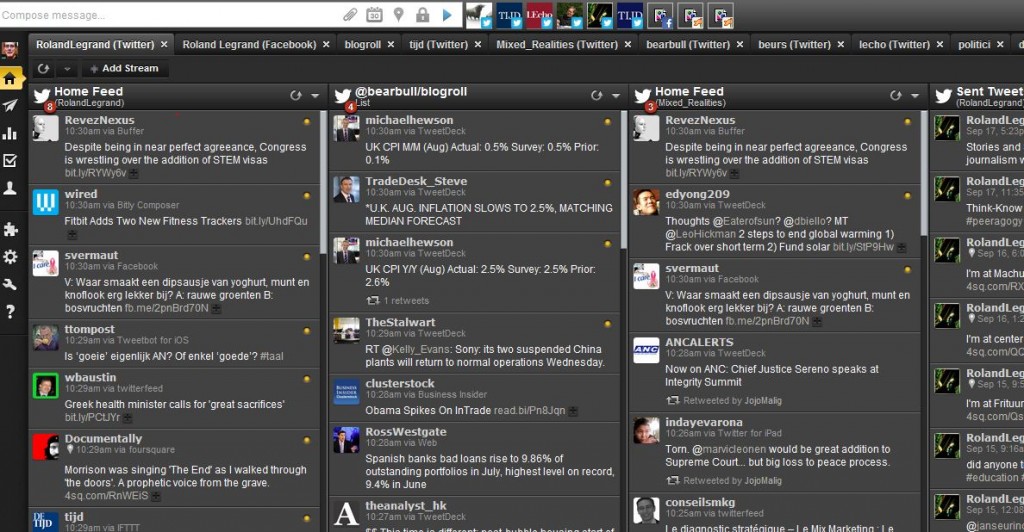(this post reflects what I told during my presentation at the neojournalism2012 conference in Brussels, Belgium).
I remember it vividly. That particular day during the never-ending euro crisis I was covering a European Summit. My newspaper colleague was attending briefings, I was at the newsroom, monitoring about 300 people we follow on Twitter regarding the crisis. I talked to some colleagues from other European newspapers, wire services, blogs and television stations, via Twitter. Some of them where at that same summit, covering the same of other briefings. I told my colleague to contact some of my Twitter contacts, while getting a word by word translation of some statements in Italian and in Greek via other tweeting journos.
Among those analyzing the events were fellow-journalists, but also economists working for banks or universities, traders in the City and on Wall Street or in Milan. It was often very difficult to see who was a journalist by profession and who was not. It did not seem to matter that very much.
Of course, the liveblog was like a stream, not like some finished, polished product. It was the reflection and part of the newsgathering process.
Sometimes I use the Twitter-site to monitor all those euro-sources, sometimes Hootsuite (a social media dashboard) or I use Flipboard on my iPad – converting the streams into a kind of glossy-looking online magazine. I use Flipboard also for other beats which interest me, but what is important to note: even though it looks like a magazine, there is no editorial staff deciding for me what I should read. It’s my selection of sources, and they come from many different media – in fact, in most cases, they are just individuals. I do not care what some newspaper or television station thinks about an important issue, but what a particular person at that organization thinks about it.
In the meantime, we are still very much involved in selling newspapers – in print, or digitally. It’s the old music industry situation: remember when you wanted to buy only one or two songs, but you had to buy the whole CD? Maybe the community wants to get the whole package about business, politics, markets and culture, but then again maybe many people would prefer just reading about one ‘beat’ or following only a few journalists. I’m pretty much convinced that we’re going through the same transformation as the music industry.
I don’t have an immediate answer in terms of a sustainable business model for the atomization of news and information. What we do at our newspaper is taking the community serious. That’s why we have liveblogs – we publish almost in real-time the raw material we see such as tweets, articles, videos, adding context and adding parts of the discussions we have. It’s a way of showing ‘the making of’, the process of news gathering, as it happens.
The liveblogs and blogs eventually lead to articles and videos, but we experiment with other forms of story-telling which of course use rich media but also have various possible entry-points. Stories do not have to be linear (my colleagues Nicolas Becquet uses Klynt for building his interactive stories). Another colleague, Raphael Cockx, uses data journalism allowing our community to analyze how their towns and villages compare, using data about income, unemployment, number of companies, growth and crime.
And of course we have long conversations with our community. I host a daily chat session and we experiment with Google Hangout On Air. It’s very different from the usual asynchronous comments on a news site – the real time interactivity facilitates more civilized, constructive conversations which teach us a lot about what people are looking for on our site.
So why deconstructon? We’re not talking about the destruction of journalism. We deconstruct it to obtain better journalism. In general, deconstruction means the questioning of boundaries, which often seem clear-cut but in reality are not (or should no longer be). The boundaries between journalists and other professions, between what is inside and what is outside the newsroom, between the journalists and the people formerly known as the audience are becoming subjects of negotiation. Not everything we discuss at the newsroom should be published in real-time, but there is a lot which can only benefit from being out there in the open.
My slides:
See previous posts for other news about the neojournalist conference:
– How the truth unfolds itself – Hermida about new media
– Journalists would be more cheerful being DJs
– The many meanings of neo-journalism
– A Storify report about the conference by my colleague Nicolas Becquet (French and English)



test commento